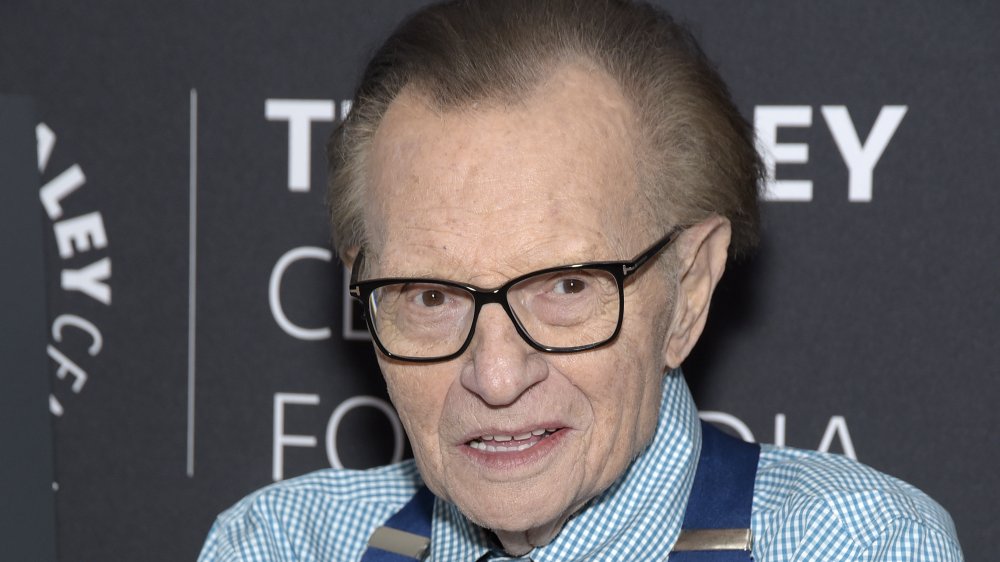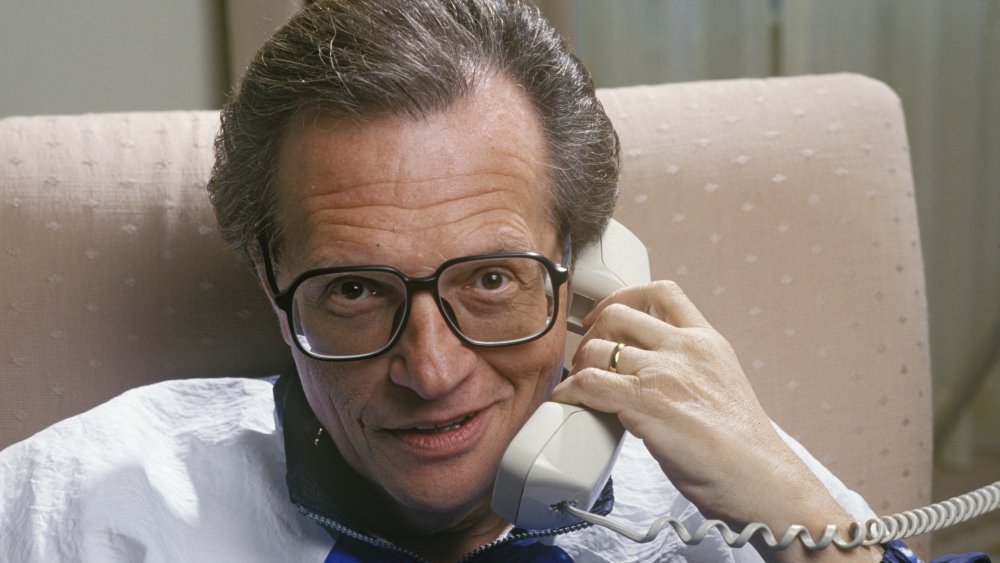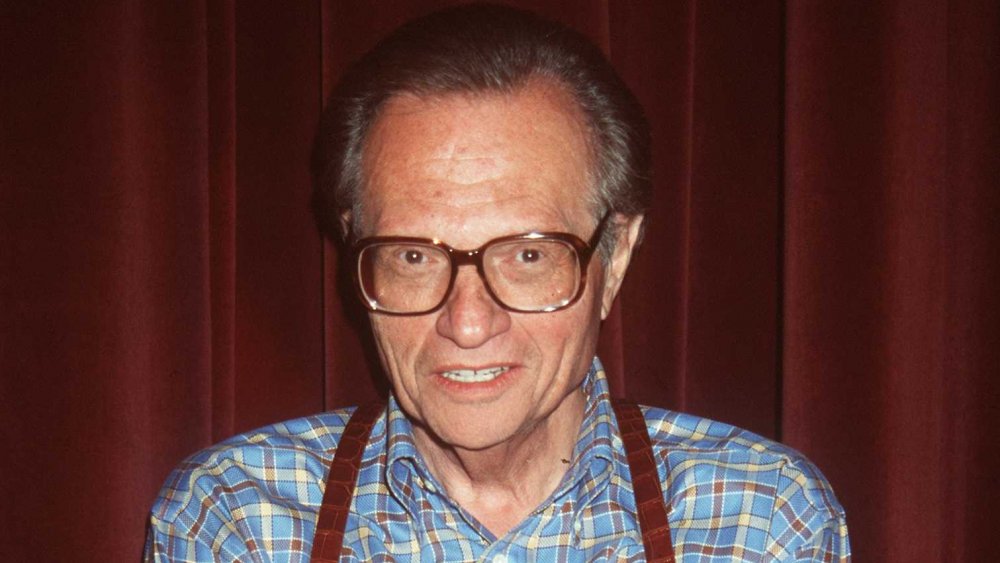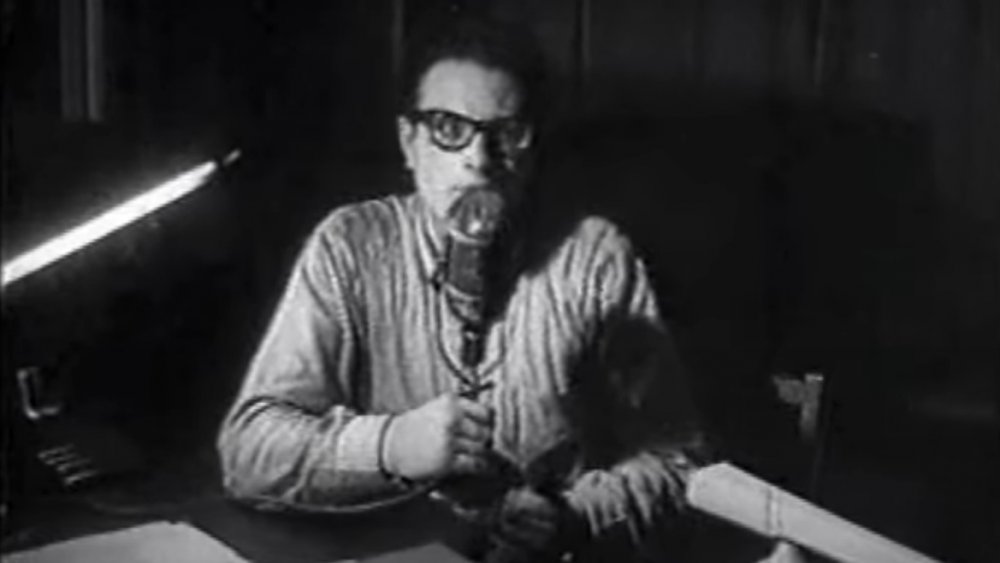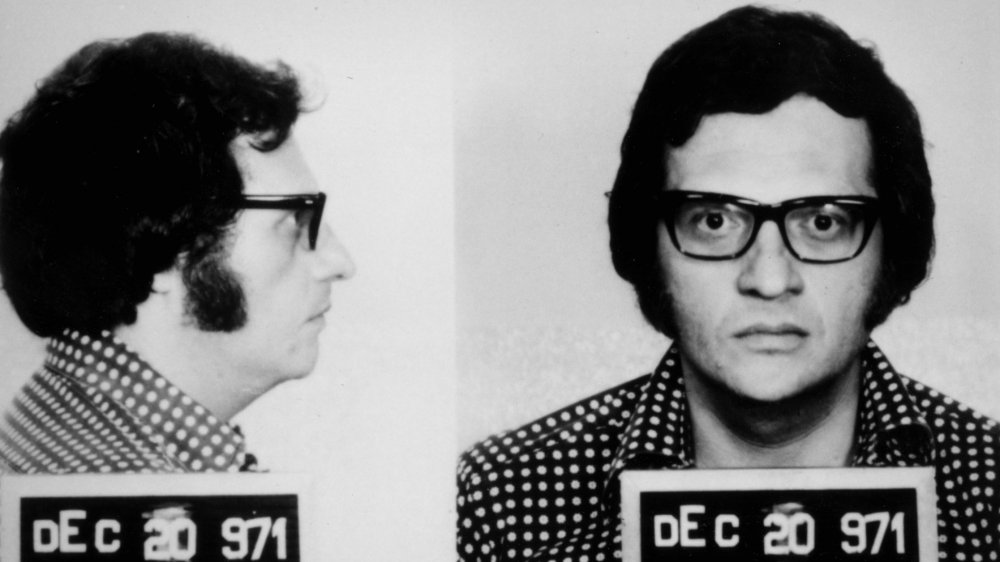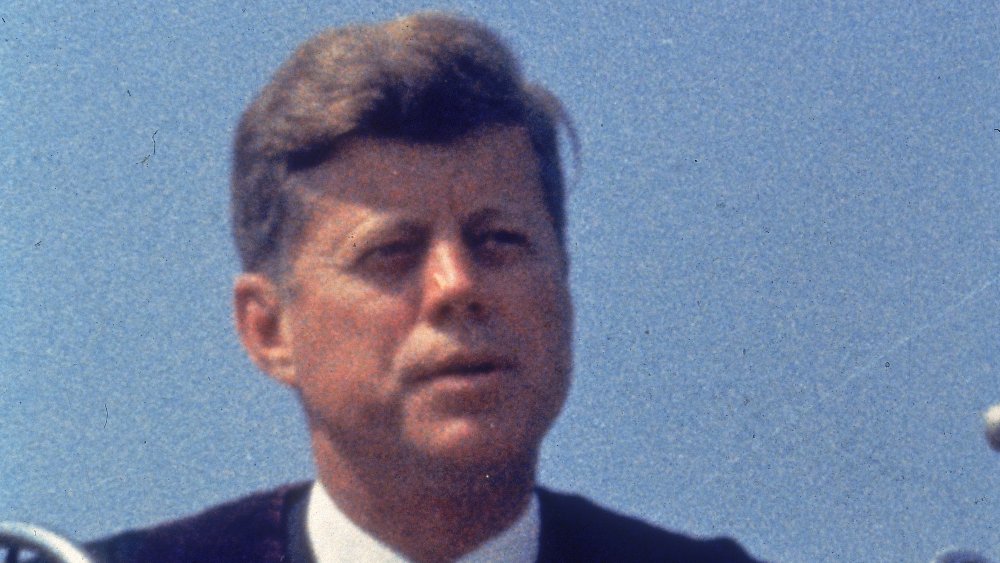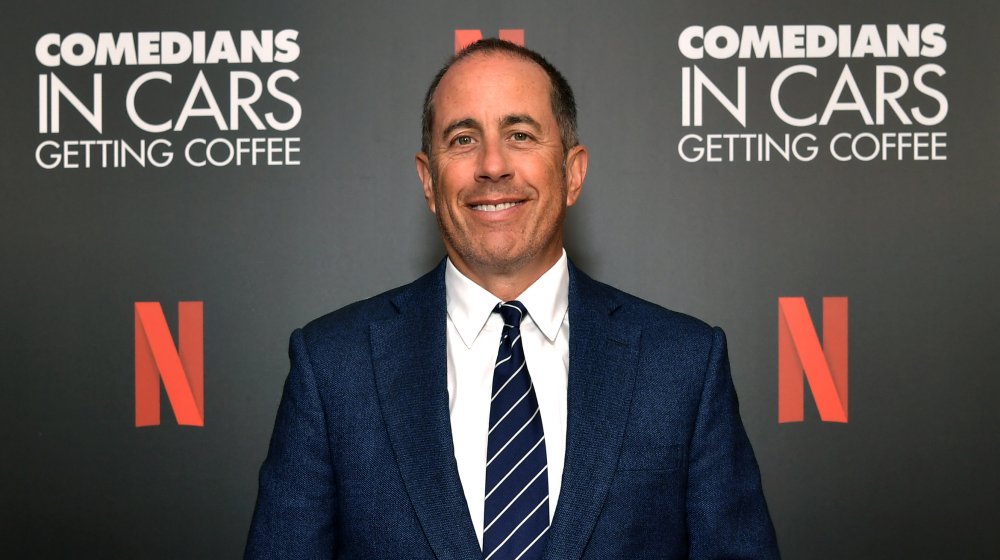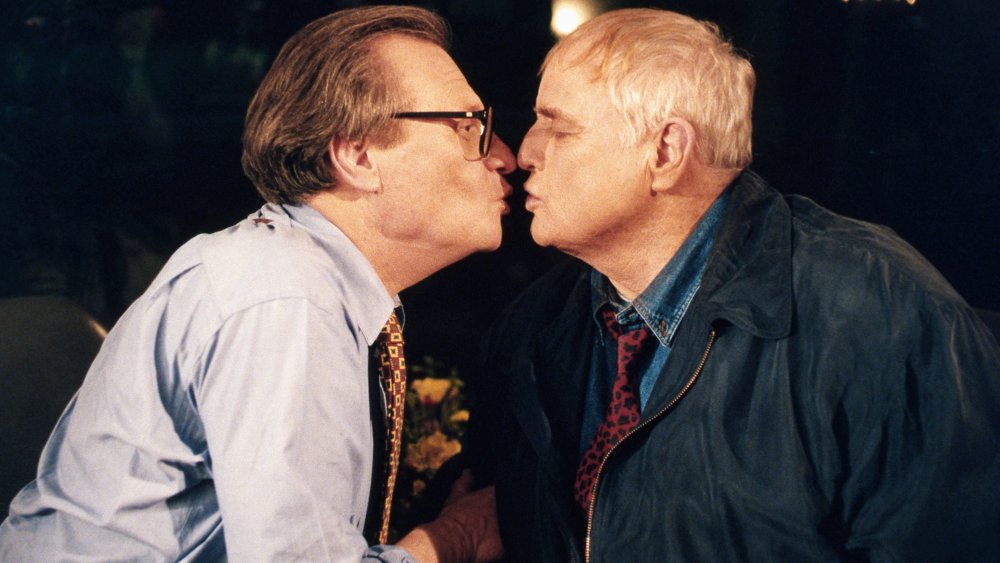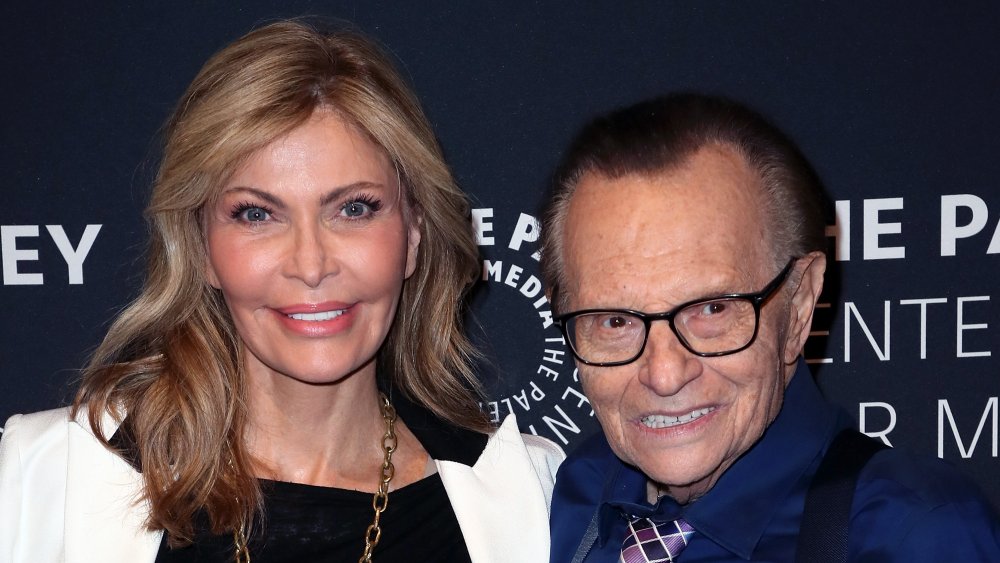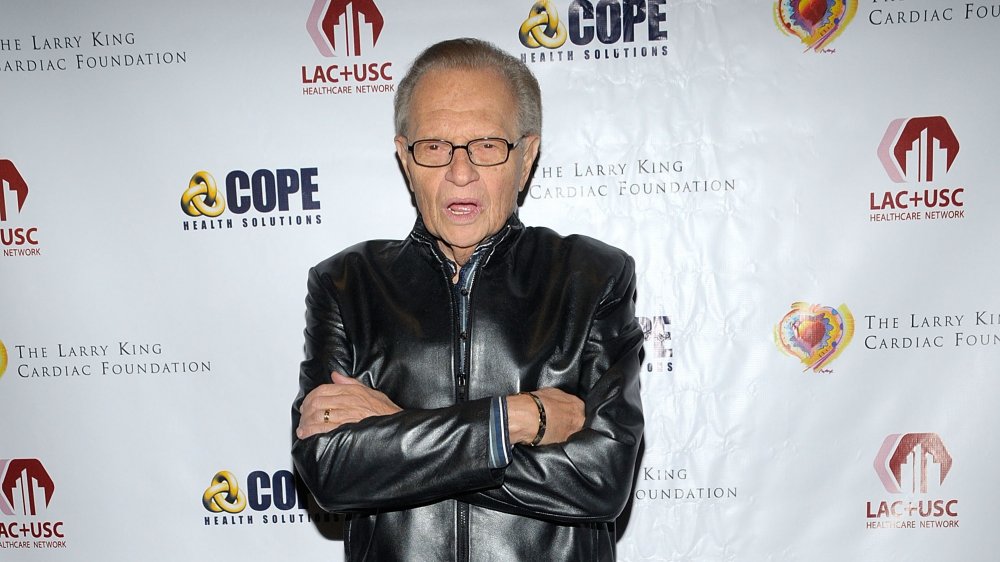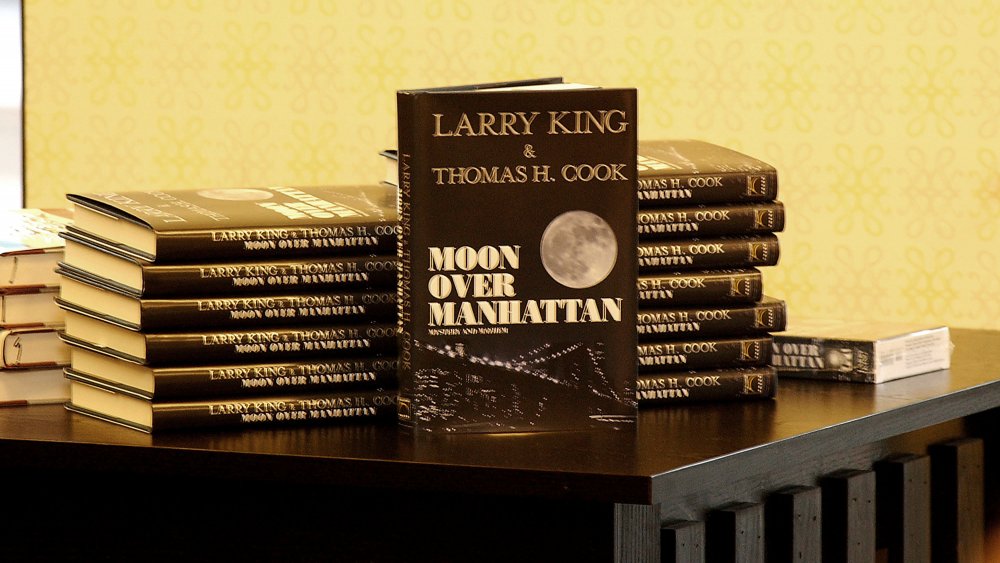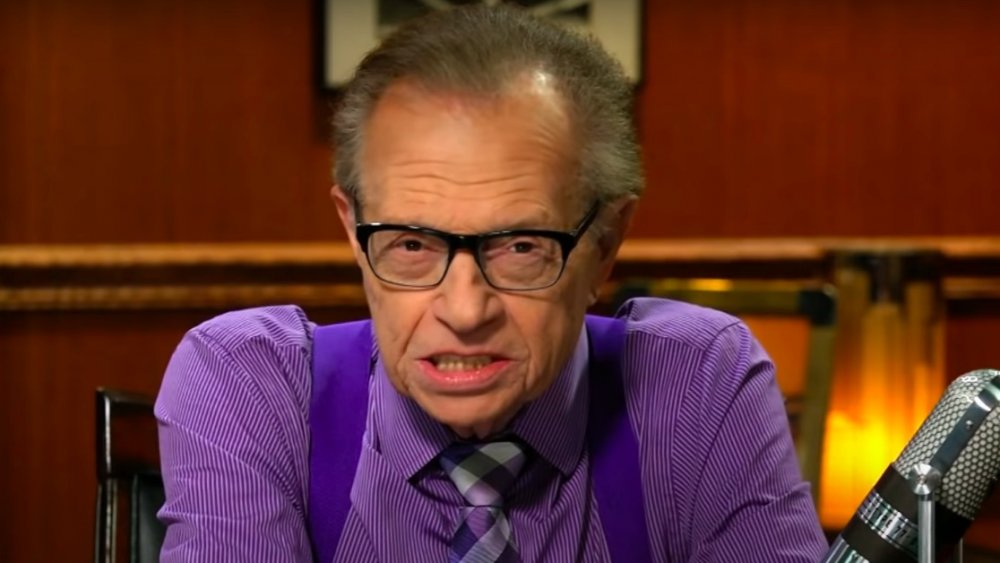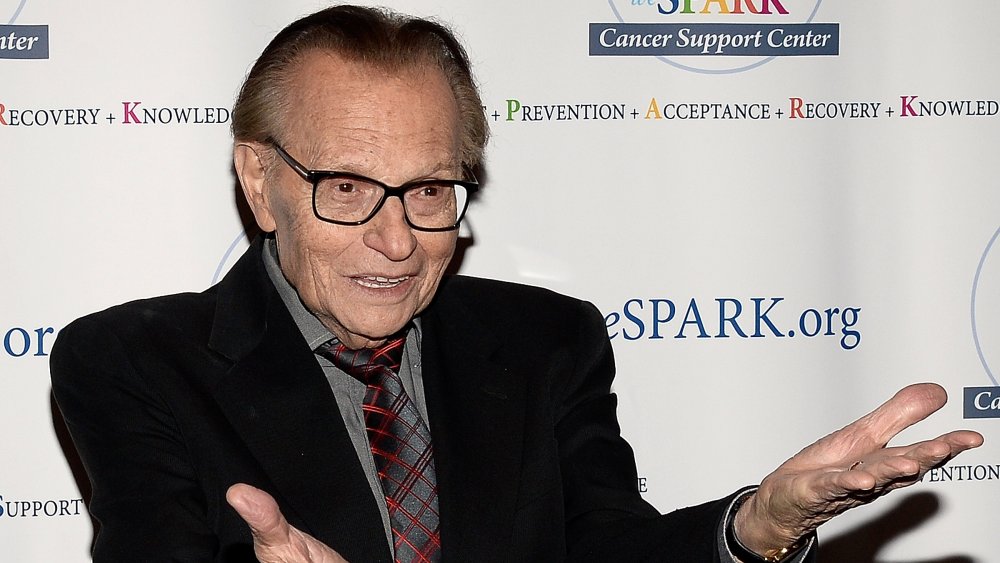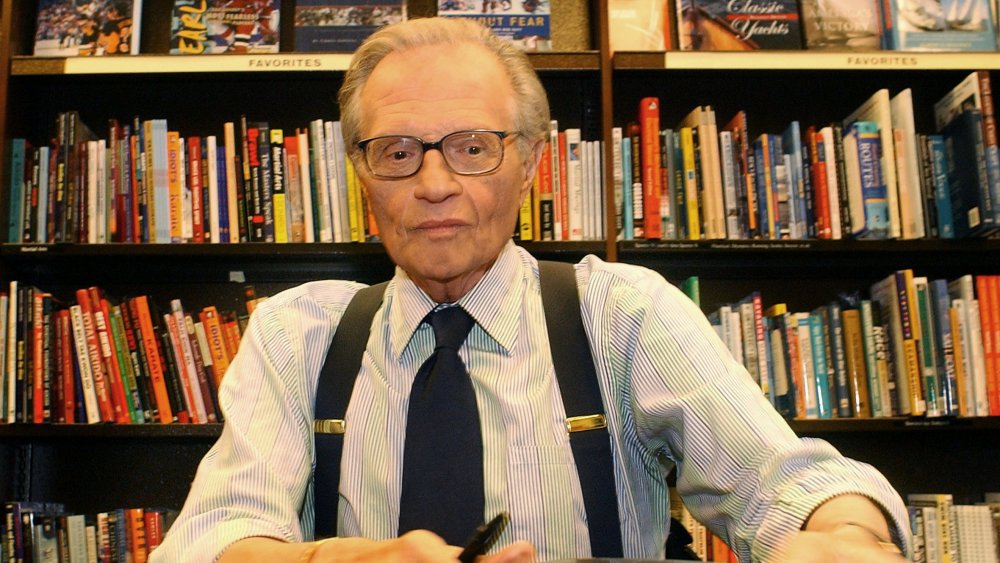The Untold Truth Of Larry King
The word "icon" gets tossed around a lot in the world of television, yet if there's one person who deserves that title, it's Larry King. Born Lawrence Harvey Zeiger in 1933, King was in his early 20s when he left his hometown of Brooklyn for Florida in order to pursue a career in radio. King proved to be a natural, thanks his easygoing, conversational style and distinctive baritone voice. His transition to TV was inevitable, and it was in that medium where he ultimately made his biggest mark, thanks to the success of his CNN talk show Larry King Live, which debuted in 1985 and ran until 2010.
That first radio job in the late 1950s proved to be the first stepping stone in a media career spanning seven decades, with King having interviewed a who's who of the hottest Hollywood stars to world leaders and newsmakers.
A ubiquitous presence on American television, even well into his 80s, King has demonstrated a staying power that few have achieved in the medium. And while his legions of viewers may think they know him pretty well, there's much to be learned by reading on to discover the untold truth of Larry King.
Larry King's name has a unique origin story
When he decided to embark on a career in broadcasting, Larry King was not yet Larry King. He shared the story of how he came to be known by his now-famous moniker during an interview with CNN's George Stroumboulopoulos.
"My name was Larry Zeiger, and it was May 1, 1957," said King, looking back at his first day on the job after being hired as on-air talent by a Miami radio station. "My first big day on the air and the general manager called me in. I had all my records prepared and he said, 'What name are you gonna use?' I said 'Larry Zeiger.' He said 'You can't use that. It's too ethnic. People won't remember, won't know how to spell it. You better change your name.'"
With just "three minutes" until he was scheduled to go on the air, the panicked young disc jockey and the station's GM searched for a solution. As he recalled, "the Miami Herald was opened, there was an ad for King's Wholesale Liquors," which prompted the general manager to suggest he go with the name "Larry King." And with that, broadcast history was made.
The Miami Dolphins signed Larry King
Miami was the city where Larry King both launched and built his career. As his on-air skills grew, so too did the opportunities. On a 2017 episode of The Turnaround, he reflected on his time as a DJ at "a small station," which included hosting a morning show at a local restaurant. He also became the voice of the Miami Dolphins, providing color commentary while announcing the NFL team's games during the 1970 and 1971 seasons.
Decades after leaving Miami, King returned to the city where the heat is on for a visit in 2017. During that trip, he spoke with the Miami Herald about his lingering fondness for what was once his adopted home. "I have a special place in my heart for Miami, and I'm still a Dolphins fan," he said. "I've been out of Miami for 40 years and had a great time there. Began my career there."
Reflecting on his years in Miami during the 1960s and 1970s, King described the city at the time as being "so loose and open. Nothing seemed permanent. Tourists and girls. And it was easy. Anything goes... It was very free, open, liberal. It was a terrific place... They say you can't go home again, well, you can."
A TV show brought Larry King in to play a deejay
In 1961, Larry King was an up-and-coming radio deejay when he was cast in a locally shot television drama, Miami Undercover. The role wasn't much of a stretch, with King playing a Miami radio deejay.
In a clip from the episode, King's character is in the broadcast booth when two shady-looking, weapon-toting men enter. They offer him a bribe to play a particular record, but he refuses, telling the pair that "I don't take payola from no creep little record outfit." When a gun is held to his head, the deejay reluctantly agrees to play ball, but turns the tables by describing the criminals live on the air, addressing the Miami Police department. Panicked, one of the goons guns him down.
King's next acting role came more than 20 years later, when he made a brief cameo in Ghostbusters. After that, the dam burst: According to IMDb, he went on to act in dozens of films and TV series (usually playing himself), in such movies as The Exorcist III and Primary Colors, in addition to TV series including Boston Legal, Murphy Brown, and The Simpsons.
Larry King was arrested for grand larceny
By the early 1970s, Larry King's career was on the rise. He was appearing on radio, television, and in print, writing a column for the Miami Herald. That apparent success masked the fact that King perpetually lived beyond his means, and was constantly in debt. Writing a bad check led King to be arrested in December 1971 and charged with grand larceny. He eventually pled no contest to passing the check, with the larceny charge tossed.
While King never served any time, the negative publicity slammed the brakes on his career. Writing about the incident on his website, King admits what he did was "stupid," leading him "to go through the embarrassment of being arrested and taken in for a mug shot." The shame was only part of it: In the wake of his arrest, he was, as he shares in the aforementioned essay, "'dismissed' from my job."
As the South Florida Sun Sentinel recalled, King didn't land another steady gig until 1975, and left Miami in 1978 for Washington, DC to host a national radio show. His luck improved significantly in 1985 when media mogul Ted Turner hired him for CNN. As King told Reuters, it was only then "that I started to make real money."
A president and Larry King got into a fender-bender
Larry King has interviewed several U.S. presidents, but there's only he's hit with his car: John F. Kennedy.
"I crashed into him," King told Anderson Cooper in a 2009 interview. "I'm a struggling little disc jockey with four friends, we drive up to Palm Beach on a Sunday morning in 1959. And there is no one on the road. It's a beautiful Sunday morning."
According to King, he was only driving about 10 miles an hour when he accidentally struck the back of Kennedy's vehicle, the only other car on the road at the time. "Head snaps back, a guy gets out of the car, he's alone. Four of us are sitting there, well, at least we didn't hurt him or — guy comes over, it's John — Senator Kennedy," King continued. "And he goes like this, how? How could you hit me? The two of us are alone on the road, it's a sunny beautiful morning. I said, 'I wasn't looking,' I was sorry. He said, 'Well, I'll tell you, I'm going to run for president next year, vote for me, swear.' So we all raised our hands, 'We swear to vote for you.'"
Jerry Seinfeld didn't expect this interview question
Larry King's distinctive interview style is the result of not doing too much prep ahead of time. "I hate interviewers who come with a long list of prepared questions because they're going to depend on going from the fourth question to the fifth question without listening to the answer of the fourth question," King explained on The Turnaround in 2017. He also shared, "Like if you wrote a book, I wouldn't read the book before I interviewed you, because I would then know too much about the book." That strategy doesn't always bear fruit. In a 1995 interview with Entertainment Weekly, he citied the time he "asked a Catholic priest if he had any children and how old they were. That's pretty dumb."
Jerry Seinfeld was likely thinking those exact three words when he appeared on Larry King Live to discuss the end of his hit sitcom Seinfeld. King asked Seinfeld to confirm that the show was not cancelled by the network, to which the comic replied, "Are you not aware of this? Are you under the impression that I got cancelled? I thought that was pretty well documented. Is this still CNN?"
Informing King that Seinfeld was "the number-one show on television" before going off the air, Seinfeld continued to chide the veteran interviewer. "Do you know who I am?" he joked. "Seventy-five million viewers, last episode... it's a big difference between being cancelled and being number one."
Marlon Brando's Larry King special sparked a frenzy
Of all Larry King's most memorable onscreen moments, the one that remains impossible to top is his delightfully loopy 1994 sit-down with Marlon Brando. The interview concluded with a brief shot of the legendary actor sitting next to King, his arm around the broadcaster's shoulder as they duet on old-timey hit "Got A Date With An Angel." At one point, Brando gives King an affectionate slap on each cheek before looking him deeply in the eyes, leaning in, and kissing him on the lips.
That kiss is listed among King's best TV moments in magazines ranging from Entertainment Weekly to Time, and generated plenty of buzz. Washington Post TV critic Tom Shales, for example, described the interview by writing, "As wastes of time go, this one was particularly and perversely entertaining." The interview even inspired a Saturday Night Live sketch, with John Travolta as Brando and Kevin Nealon impersonating King, who rubs the actor's feet with oil and dons a baby bonnet at his request.
As King shared in his book Truth Be Told, the Brando interview became the one interview that he's "most asked about," writing, "It ain't even close."
Larry King's been married eight times
The phrase "lucky in love" decidedly doesn't apply to Larry King. In 2019, People reported that King, who was then 85, filed for divorce from wife Shawn Southwick King after 22 years of marriage. The divorce filing was his eighth. In the wake of this news, Divorce Magazine chronicled King's various marriages to seven different women, and yes, that math checks out: He actually married and divorced Playboy bunny Alene Akins twice. King's most recent marriage was also his longest; the shortest was with second wife Annette Kaye, with both the wedding and the divorce both taking place in 1961.
Speaking with People about his 2019 divorce filing, King said his and Southwick's 26-year age gap "became an issue." He also offered an explanation for his plethora of ex-wives. "I got married a lot," he admitted. "But in my head, I'm not a marrying guy. When I grew up, nobody lived together. If you fell in love, you got married. And so I married the ones that I loved." However, King said that his marriages ended when he outgrew them, noting that "what I loved at 20 is not what I loved at 30 and what I loved at 30 is not what I loved at 40."
Larry King waged a secret battle with lung cancer
Larry King's health woes have been well documented over the years. He suffered his first heart attack in 1987, requiring bypass surgery; his most recent heart attack occurred in 2019. As he explained during a WebMD live event, when it came to maintaining his health, he "didn't do anything right." He was also a heavy smoker, noting that he "smoked sometimes up to three packs per day."
While he ditched cigarettes immediately after his first heart attack, that three-pack-a-day habit may have had later repercussions when, in 2017, he shared he had been diagnosed with lung cancer. Unlike his headline-generating 1987 heart attack, he kept this health ailment secret.
King made the revelation in an interview with Us Weekly. "The doctor said to me, 'It was malignant but you were in the first stage. If it had stayed and we didn't find it, you would have had trouble in two or three years, but we got it and you were lucky,'" he explained. After undergoing surgery, King was back at work two weeks later. He declared that his latest chest X-ray was "all clear" after surgery removed "20 percent of the lung."
Larry King wrote a mystery novel
In addition to his radio and television broadcasts, Larry King also had a column in USA Today. Before the newspaper dropped King's column in 2001, he wrote it for two decades. In addition to his USA Today gig, King has written more than a dozen books, including one focusing on prayer, another on his love of baseball and even a book about Princess Diana.
One thing readers may not know is that King is also the author of a murder mystery, the 2003 novel Moon Over Manhattan, which he co-wrote with Thomas H. Cook. The website of NBC's Today shared an excerpt, along with King's foreword explaining that he and Cook wrote the book as a response that would move past the "darkness and terror" of 9/11. As a result, the novel was envisioned as "a lighthearted tribute to all the crazy, wonderful characters who inhabit New York... we wanted to write a caper, something light and funny."
A review in Publisher's Weekly described Moon Over Manhattan as "a delightful farce" and "a riotous tale that should have not just Gotham but all of America singing, 'New York, New York, what a wonderful town!'
A fake interview pulled one over on Larry King
Following the end of CNN's Larry King Live in 2010, Larry King eventually launched a new talk show, Larry King Now, on the Ora television network. While at Ora, King also developed a sideline as an infomercial pitchman, shilling for such products as Breathgemz, a prostate treatment, and the OmegaXL diet supplement.
Moonlighting in infomercials may have been lucrative but it landed King in an awkward situation in 2019. According to a report in ProPublica, King was paid to host what was billed as a "U.S. China special conference," in which he was given a list of scripted questions to ask Russian journalist Anastasia Dolgova. King recorded his answers separately, with Dolgova's responses then edited in. Upon seeing the finished product, King's producers became concerned that King had been duped into spreading disinformation on behalf of the Chinese government. In a YouTube video titled "How Larry King Unwittingly Starred in Chinese Propaganda," ProPublica reported Twitter removed over 200 fake accounts that posted a link to the interview. The outlet also noted Dolgova declined to comment.
"It's unfortunate that Larry found himself unwittingly being exploited," Ora CEO John Dickey told ProPublica, blaming King's affable personality. "I've seen it over the years. He'll talk to anybody. He'll give access to anybody, to a fault." Noting that what took place "was obviously not right," Dickey insisted that "Larry didn't know."
Larry King said the secret to his success is being dumb
Larry King doesn't like to do a lot of research on the guest he interviews, believing that leads to a more freewheeling, anything-goes conversation. In addition, he said on a 2017 episode of The Turnaround, it places him in the same uninformed position as the typical viewer. "I'm a pure layman who's intensely curious," King insisted, explaining that when asking questions "I just know that I go to the basics."
Some call it curiosity, whereas others may have another word for it. Speaking with The Guardian, King revealed that a friend once told him, "You know the secret of your success? You're dumb."
As an example, he pointed to a guest he had just interviewed, British television presenter Mary Berry of The Great British Bake Off. As The Guardian pointed out, it was apparent that King had "little idea who Berry is." King concurred, but used the chef-turned-television personality as an example to prove his point. "Like with the lady today — why do you want to bake cakes? What makes a good cake? What cakes do you like? What cakes don't you like?" said King. "I'm dumb. I don't know a thing about baking."
TV has been good to Larry King's bank account
Larry King was once so broke he was arrested for bouncing a $5,000 check, with The Telegraph recalling that he declared bankruptcy in 1978, listing debts of about $350,000. Since then, however, his financial position has improved significantly. According to Celebrity Net Worth, King is worth an estimated $50 million. Like many celebrities who get rich in their line of work, the talk show host has thrown some of that cash into real estate: In January 2020, TMZ reported he and estranged wife Shawn Southwick King sold their mansion for $15.5 million.
Making big money came later in life for King. It wasn't until 1985, when he was in his 50s, that he landed the CNN gig that brought the big bucks. "I really started making major money at 55," he told the South Florida Sun Sentinel. "That's not young to start making money. It's kind of a hoot."
Even then, King admitted he's always had a somewhat odd disconnect with money. "I have never seen one of my own paychecks, actually," he said. "I have it all sent to my money managers in Boston. They handle my mortgage, my credit cards, everything... I'm not good with business or finances. That's not my facility."

